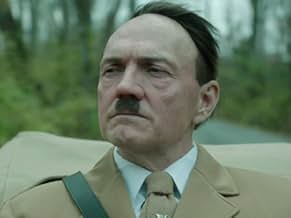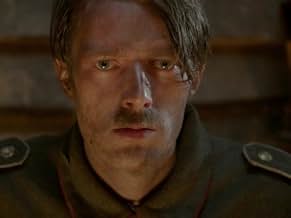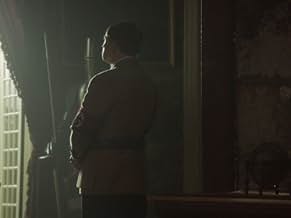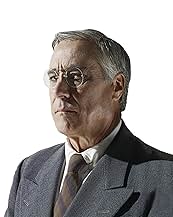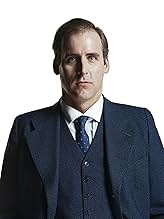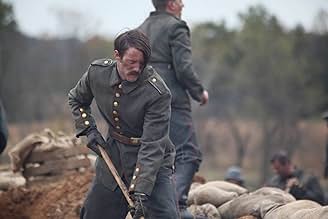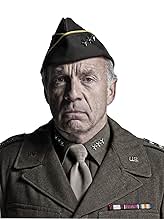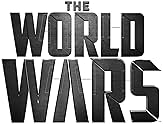IMDb RATING
7.9/10
2.5K
YOUR RATING
A look at both World Wars and what the biggest names in history did during each war and the time in between.A look at both World Wars and what the biggest names in history did during each war and the time in between.A look at both World Wars and what the biggest names in history did during each war and the time in between.
- Nominated for 3 Primetime Emmys
- 1 win & 4 nominations total
Browse episodes
Featured reviews
I was flipping channels and came across this dreck a little less than 1/2 way through. I started to watch and within seconds found myself saying, "How did that...?" " When did....?" "That's not right." "I'm not genius or expert, but WHAT THE....?" and so forth.
VERY few of the actors looked much like their characters as if the casting director simply said, "If they're white and male, feh, it works. Oh, but put a pair of glasses on that guy."
As other reviews have mentioned, poetic license is to be expected to some degree and honestly, with that much of a timespan to cover and all that material, one has to be realistic enough to know that you can't include every detail or you'd end up with a movie almost as long as the war itself. It's just not going to happen. But with that in mind, isn't it in everyone's best interest to get what you ARE covering more than a LITTLE right?
The History Channel has become a joke. What was once one of the most fascinating and informative channels for us history buffs has become a hodgepodge of reality crap shows. It's heartbreaking, but my anti-TV executive rants are common in my reviews, so, here's more evidence to back up my beliefs. When they DO an actual history show, I guess we shouldn't expect much more from them than this.
And this stinker is now 4 years old. Sheesh, now I'm starting to cry.
VERY few of the actors looked much like their characters as if the casting director simply said, "If they're white and male, feh, it works. Oh, but put a pair of glasses on that guy."
As other reviews have mentioned, poetic license is to be expected to some degree and honestly, with that much of a timespan to cover and all that material, one has to be realistic enough to know that you can't include every detail or you'd end up with a movie almost as long as the war itself. It's just not going to happen. But with that in mind, isn't it in everyone's best interest to get what you ARE covering more than a LITTLE right?
The History Channel has become a joke. What was once one of the most fascinating and informative channels for us history buffs has become a hodgepodge of reality crap shows. It's heartbreaking, but my anti-TV executive rants are common in my reviews, so, here's more evidence to back up my beliefs. When they DO an actual history show, I guess we shouldn't expect much more from them than this.
And this stinker is now 4 years old. Sheesh, now I'm starting to cry.
The Germans made continental war because they had not fleet. They had not fleet because the treaty of Vesailles did't allow it. Tanks and Airplaine could be built in secrecy in Hangars, which is much more difficult with ships. The negotiations after world war One were still held form a colonial perspective, which led to all the following problems. Borders and Lands were traded by the winning Nations like pieces of cake on a market. Italy and Japan, in World War One on the side of the Alliance were cheated, which led to the following conflicts. The War between Japan and the USA was the first war about Oil. All in all, cheesy acting, but good history telling.
I've been enjoying the show, but you have to really know the true history and then make allowances for the "Cliff Notes version" (see http://www.cliffsnotes.com/) that this is. It's highlights and simplification.
Bear in mind that the "History" channel now includes a heavy dose of alien and UFO conspiracy theory, ghost hunting and religion bashing. Everything on History needs to be taken in the context of other sources or you will surely be mislead. I could fill a couple of pages with historical misstatements or omissions in this program, but it does add something to the overall story, so long as you don't take it as the single source! They portrayed the main German attack as coming through the Maginot line when in fact it was bypassed by attacking through the same Ardennes forest they later used in the Battle of the Bulge. Never mentioned was the 8th Army battle in North Africa, or the role of Field Marshall Erwin Rommel. No mention of the Battle of the Atlantic. Also ignored was the role that the Japanese war in China played in American - Japanese relations.
All in all, it is a good story which can be a good addition to the overall narrative, but you really need to already understand the entire context in order to not be mislead. Movies and mini-series can bring stories to life, but there is really no substitute to actually reading the many wonderful memoirs of the people who were actually there!
Having just watched it again, in addition to the omissions and over-simplifications, there are also glaring mis-statements of fact and factual error galore. It will suffice to point out just two: #1 they stated that Patton defeated Italy in six weeks, when he was actually NEVER involved in the Italian campaign which lasted nearly to the end of the war. He (and Field Marshall Montgomery) won the battle of Sicily. BTW How anyone can discuss Patton without discussing Montgomery as well is beyond anyone who knows the story. #2 they leave the impression that Patton was only called back to duty during the Battle of the Bulge, when in fact, it was Patton who led Operation Cobra, which created the breakout from the Normandy beachhead in August.
Bear in mind that the "History" channel now includes a heavy dose of alien and UFO conspiracy theory, ghost hunting and religion bashing. Everything on History needs to be taken in the context of other sources or you will surely be mislead. I could fill a couple of pages with historical misstatements or omissions in this program, but it does add something to the overall story, so long as you don't take it as the single source! They portrayed the main German attack as coming through the Maginot line when in fact it was bypassed by attacking through the same Ardennes forest they later used in the Battle of the Bulge. Never mentioned was the 8th Army battle in North Africa, or the role of Field Marshall Erwin Rommel. No mention of the Battle of the Atlantic. Also ignored was the role that the Japanese war in China played in American - Japanese relations.
All in all, it is a good story which can be a good addition to the overall narrative, but you really need to already understand the entire context in order to not be mislead. Movies and mini-series can bring stories to life, but there is really no substitute to actually reading the many wonderful memoirs of the people who were actually there!
Having just watched it again, in addition to the omissions and over-simplifications, there are also glaring mis-statements of fact and factual error galore. It will suffice to point out just two: #1 they stated that Patton defeated Italy in six weeks, when he was actually NEVER involved in the Italian campaign which lasted nearly to the end of the war. He (and Field Marshall Montgomery) won the battle of Sicily. BTW How anyone can discuss Patton without discussing Montgomery as well is beyond anyone who knows the story. #2 they leave the impression that Patton was only called back to duty during the Battle of the Bulge, when in fact, it was Patton who led Operation Cobra, which created the breakout from the Normandy beachhead in August.
Do not watch this series expecting a comprehensive study of both World Wars a la Ken Burns's Civil War. It's not. However, it presents a cause-and-effect survey of how connected the two wars were.
First the negative: This program focuses on a few key figures yet totally omits any mention whatsoever of Eisenhower. How do you cover D-day without at least mentioning the name Eisenhower? Eisenhower was the ONLY 5 star general, yet two others in this program erroneously wore 5 star insignia.
Positive: Jeremy Renner did a great job narrating. The series is educational and worth watching. Although it's imperfect, I learned a few things from this series. I like how it treats both World Wars as one conflict because it was. The Treaty of Versailles wasn't a peace treaty at all and set the stage for resumption of fighting.
This series will leave you hungering for more, in depth programs that once were offered by The History Channel before they chose to waste our time on such nonsense as Pawn Wars.
First the negative: This program focuses on a few key figures yet totally omits any mention whatsoever of Eisenhower. How do you cover D-day without at least mentioning the name Eisenhower? Eisenhower was the ONLY 5 star general, yet two others in this program erroneously wore 5 star insignia.
Positive: Jeremy Renner did a great job narrating. The series is educational and worth watching. Although it's imperfect, I learned a few things from this series. I like how it treats both World Wars as one conflict because it was. The Treaty of Versailles wasn't a peace treaty at all and set the stage for resumption of fighting.
This series will leave you hungering for more, in depth programs that once were offered by The History Channel before they chose to waste our time on such nonsense as Pawn Wars.
It was bad enough that Chamberlain is shown flying to Germany in a Lancaster bomber, a plane that did not exist at the time, but the true problem was the fact that they showed just Chamberlain and Hitler discussing the fate of the Sudetenland, nobody from France, nobody from Italy.
The statement was made at one point that French and English troops were stationed in the Rhineland when, in 1936, Hitler sent troops in to that area. The British and French troops left in 1930.
The Japanese did not go to war in the 1930's because they had been snubbed at Versailles, they got all of the German possessions in the Pacific at Versailles. That is hardly a snub.
The US did not enter WWI because of the Zimmerman telegram, but because Germany announced unrestricted submarine warfare would resume.
There is plenty more but I could not stand to watch all of it. I turned it off about halfway through.
The statement was made at one point that French and English troops were stationed in the Rhineland when, in 1936, Hitler sent troops in to that area. The British and French troops left in 1930.
The Japanese did not go to war in the 1930's because they had been snubbed at Versailles, they got all of the German possessions in the Pacific at Versailles. That is hardly a snub.
The US did not enter WWI because of the Zimmerman telegram, but because Germany announced unrestricted submarine warfare would resume.
There is plenty more but I could not stand to watch all of it. I turned it off about halfway through.
Did you know
- TriviaThe actor who plays General Douglas MacArthur (Daniel Michael Berkey) is the same actor from another History Channel production, The Men Who Built America. He plays JP Morgan's father, Junius.
- GoofsDuring the 1930s when Douglas MacArthur was army Chief of Staff he did not have five stars. That did not happen until December, 1944.
- How many seasons does The World Wars have?Powered by Alexa
Details
- Runtime4 hours 30 minutes
- Color
- Sound mix
- Aspect ratio
- 1.78 : 1
Contribute to this page
Suggest an edit or add missing content



